CHRISTIAN LIVING Luke 6:12-38
This study was given using a PowerPoint presentation which can be copied from HERE. I have also provided each slide as a JPEG which you can copy by selecting 'SLIDE n'. Otherwise use this study as you see fit!

SLIDE 1 (Black)
Those of you with Bibles might like to turn to Luke 6 starting at verse 12.
Jesus was in Galilee near Capernaum (Luke 7:1). There were hundreds of people who followed Jesus. Some were simply intrigued. Those people who had accepted that Jesus was the Messiah, and who were regular followers were called disciples.
The first thing we are told is that Jesus went out to a mountainside to pray, and then went on to actually spend all night in prayer. What he was about to do and say was very important and he had to get it right. When morning came, he called a number of the disciples to him.
That morning he chose twelve of them to be his Apostles. These were people who would be his particular ambassadors to the world. They were people who would represent him and who would be able to act with his authority and power.
Then with those Apostles and Disciples, he went down to join other Disciples, and the crowds that had come, not only from all over Judea and Jerusalem, but from the Gentile towns of Tyre and Sidon, further to the north.
Often when reading in the New Testament we come across the phrase ‘Jesus taught them’ but then we are not told what Jesus actually taught. But here we have it in detail. And we will see that what he said was primarily addressed to those in the crowd who he had just appointed, and those others who were already Disciples.
So what was it that was important for his new Apostles, and his Disciples – like us – to hear
Well the teaching of Jesus that followed is perhaps one of his most well-known and includes the passage that we call ‘The Beatitudes’.
These are the passages that start ‘Blessed are the poor …..’, and this passage also contains what has come to be called ‘The Golden Rule’.
Can someone tell me what the Golden Rule is?
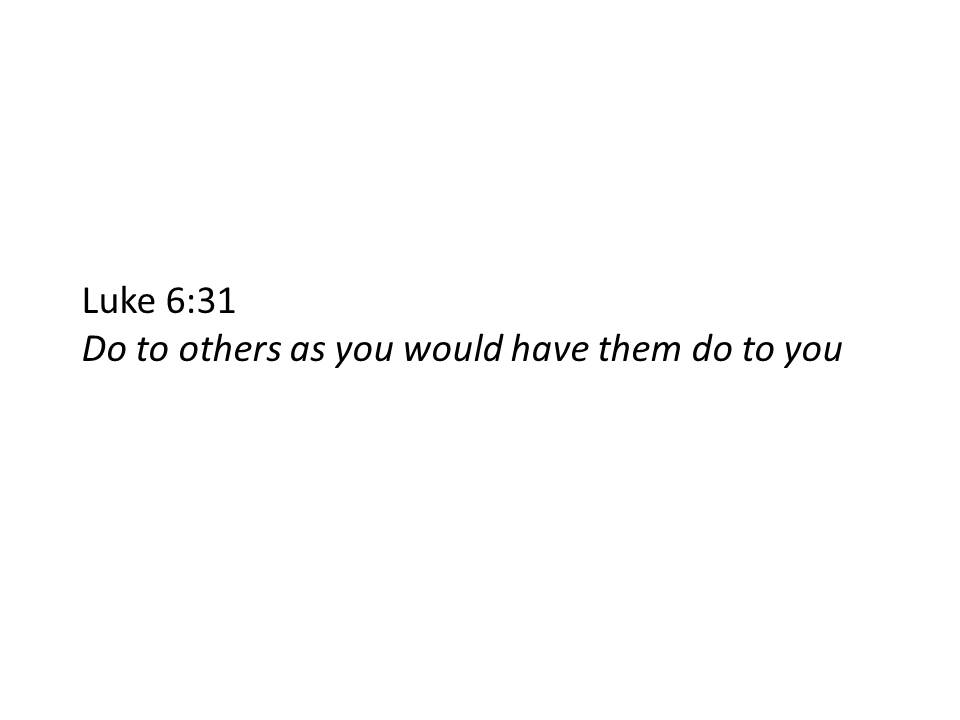
SLIDE 2
‘Do to others as you would have them do to you’.
‘The Golden Rule’ has generally been accepted as the best way for people to try to get on together in civilised society.
How might we paraphrase it? I’ve come up with some suggestions
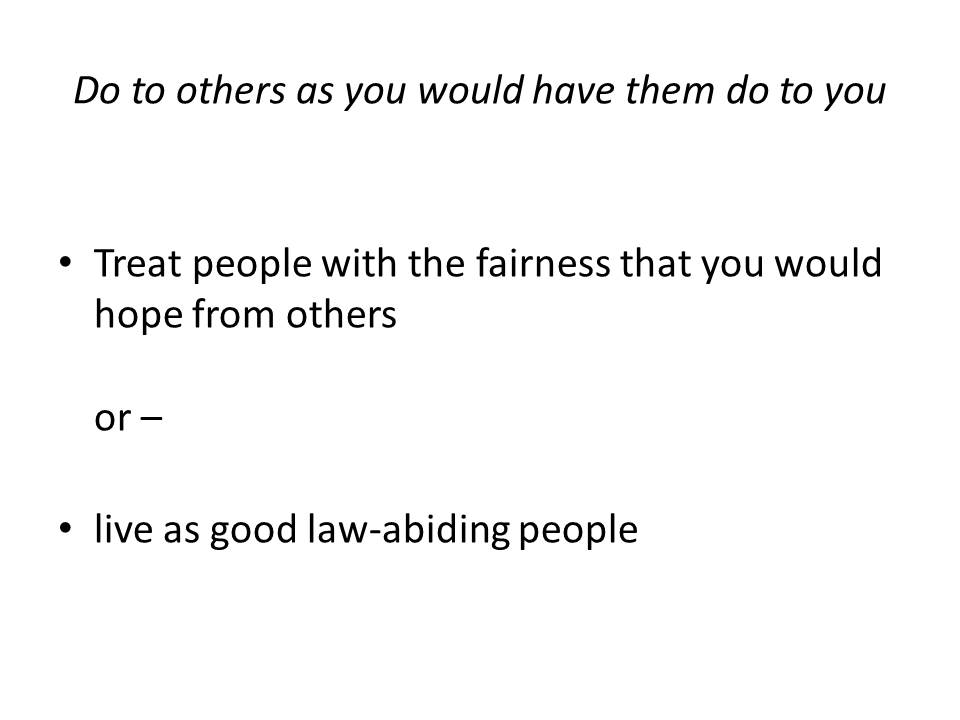
SLIDE 3
‘Treat people with the fairness that you would hope from others’ or – ‘live as good law-abiding people’.
Are we happy with that?
But was that what Jesus was teaching? Sometimes there are well-known passages in the bible that because they are so well known, we assume we know what they say. We don’t need to look at them again.
Well I think we may have missed something, so today we are going to see if there is anything we have overlooked. We are reading from Luke chapter 6 from verse 20.
Look carefully at this first passage
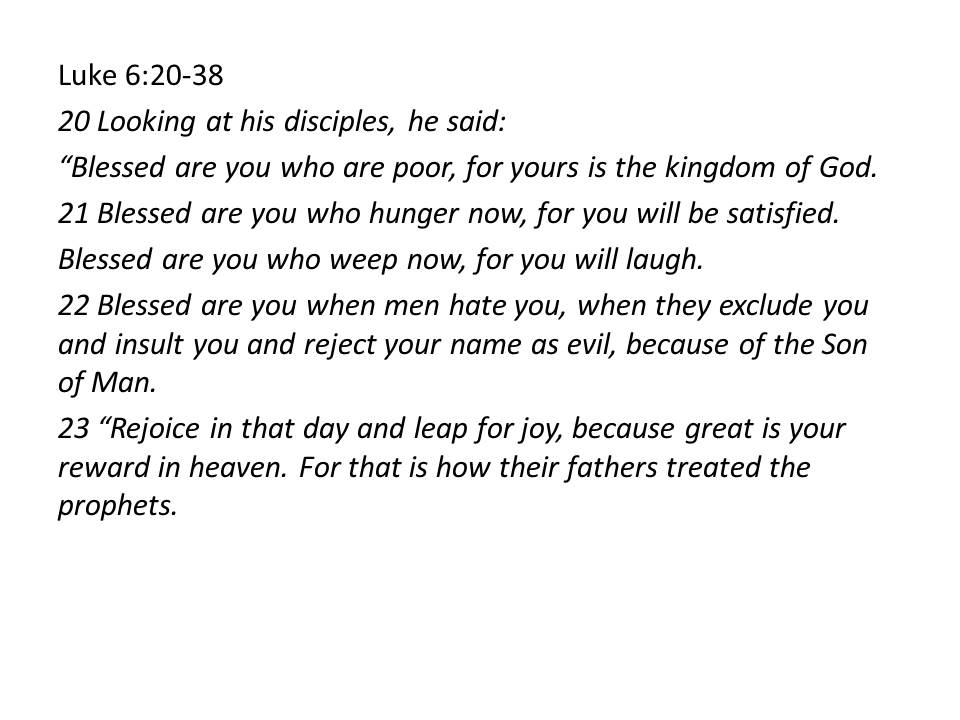
SLIDE 4
READER:
20 Looking at his disciples, he said
“Blessed are you who are poor, for yours is the kingdom of God.
21 Blessed are you who hunger now, for you will be satisfied.
Blessed are you who weep now, for you will laugh.
22 Blessed are you when men hate you, when they exclude you and insult you and reject your name as evil, because of the Son of Man.
23 “Rejoice in that day and leap for joy, because great is your reward in heaven. For that is how their fathers treated the prophets.
We don’t have any problem with those verses. But then, if we are honest, they don’t actually apply to us.
I don’t really think I could say I was poor, hungry, weeping, hated, excluded, insulted or rejected. But perhaps it’s comforting to know these verses are there in case we need them.
So perhaps we‘d better read on – verses 24 to 26
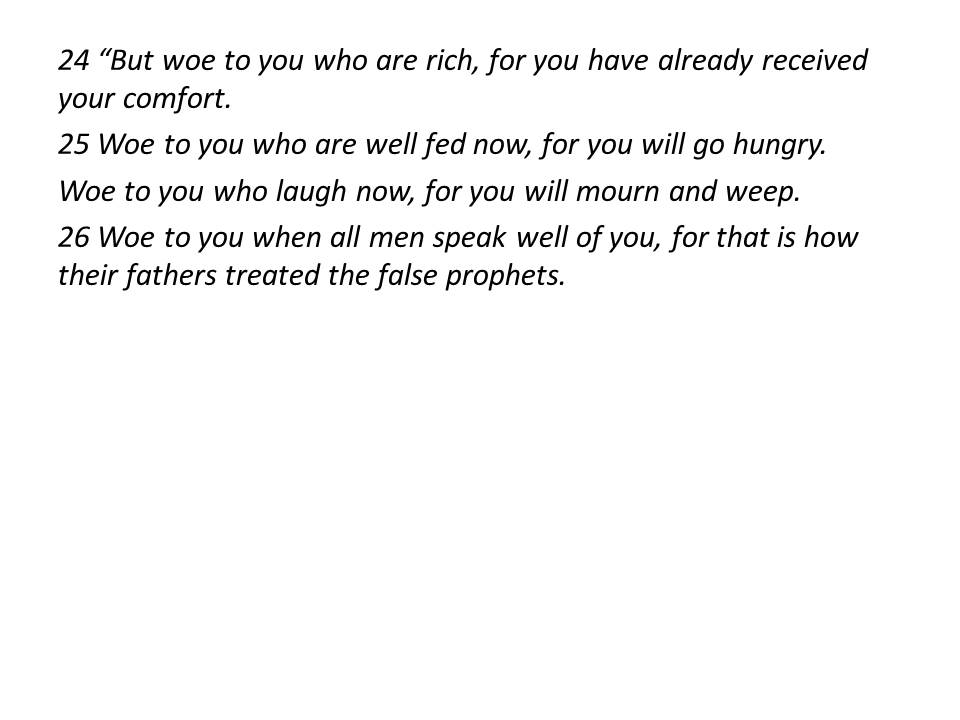
SLIDE 5
24 “But woe to you who are rich, for you have already received your comfort.
25 Woe to you who are well fed now, for you will go hungry.
Woe to you who laugh now, for you will mourn and weep.
26 Woe to you when all men speak well of you, for that is how their fathers treated the false prophets.
Oh dear – compared to many I’m rich, well fed, I often laugh, and hopefully people speak well of me.
What is Jesus saying?
He is actually warning us to stop being complacent with the way we live and the attitudes that we have come to accept as normal. We need to be careful how we read what the Bible says.
Here Jesus is introducing the idea that his thoughts are diametrically opposite to ours – and so getting our minds ready for the passage we will be looking at now which starts at verse 27
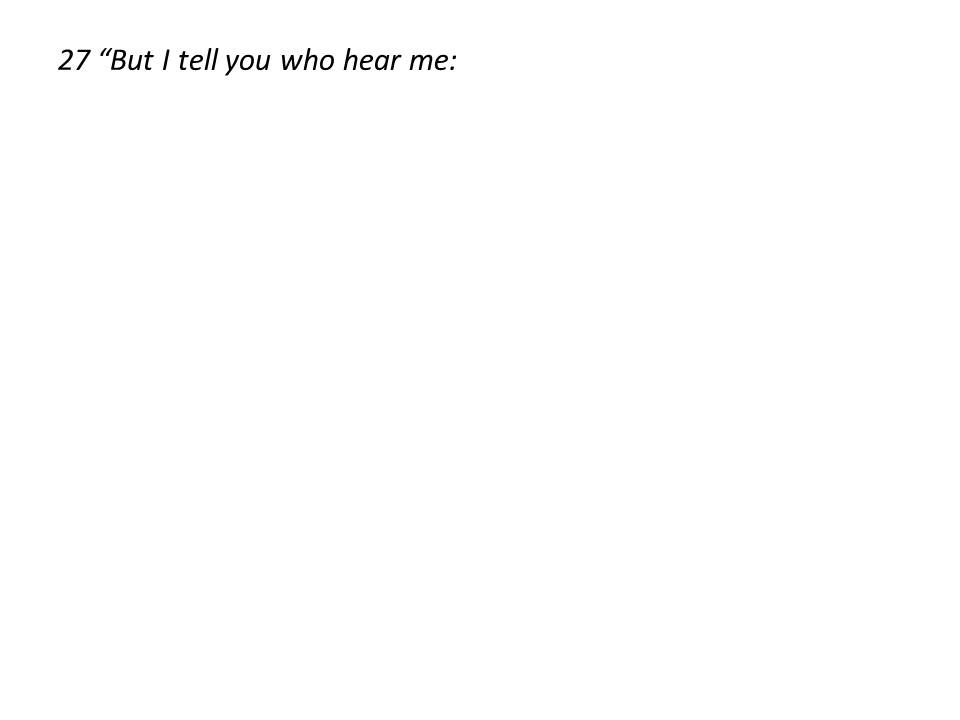
SLIDE 6
Me READ:
27 “But I tell you who hear me:
IF you really want to understand what Jesus is saying – you’ve got to listen to what he says!
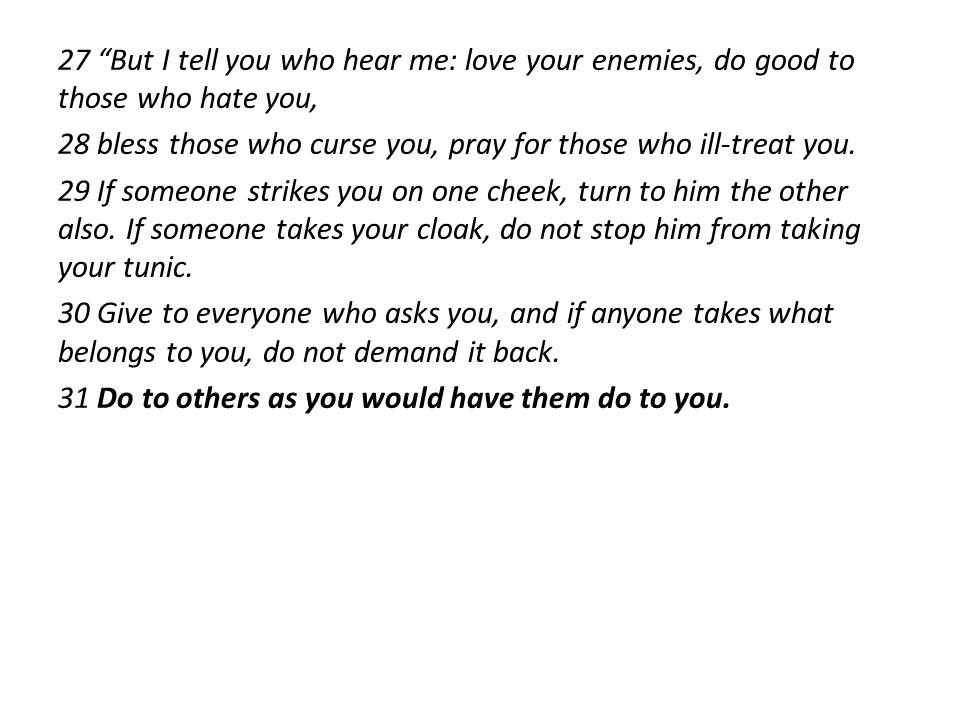
SLIDE 7
READER:
27 “But I tell you who hear me: love your enemies, do good to those who hate you,
28 bless those who curse you, pray for those who ill-treat you.
29 If someone strikes you on one cheek, turn to him the other also. If someone takes your cloak, do not stop him from taking your tunic.
30 Give to everyone who asks you, and if anyone takes what belongs to you, do not demand it back.
31 Do to others as you would have them do to you.
The first thing that should be obvious is that this is a passage that we really don’t like.
And that is because the things that Jesus is actually saying in verses 27 to 30 are so disturbing that generally Christians simply ignore them.
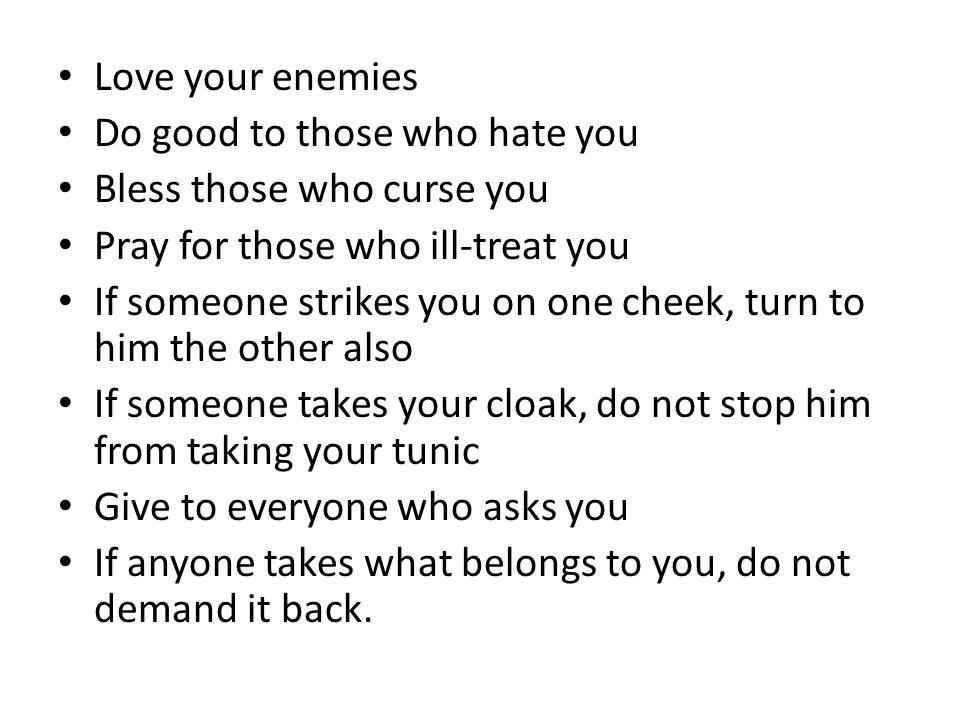
SLIDE 8
- Love your enemies
- Do good to those who hate you
- Bless those who curse you
- Pray for those who ill-treat you
- If someone strikes you on one cheek, turn to him the other also
- If someone takes your cloak, do not stop him from taking your tunic
- Give to everyone who asks you
- If anyone takes what belongs to you, do not demand it back.
So perhaps we do need to look at what Jesus is actually commanding here.

SLIDE 9
1) Love your enemies.
Let’s think who our enemies could be. Wait for people to think
We could start with anyone who commits a criminal act against us. We might then go on to include any who would spoil our enjoyment of a peaceful life.
If instead I asked the question ‘Who is my neighbour?’ we would be quick to reply – we can all quote the parable of ‘the Good Samaritan’. (Luke 10:30-35) But to start to imagine who I would consider to be my enemy is much harder.
Think about that Parable of the Good Samaritan. Suppose we were going to act it out. I’d need an Inn-Keeper. Not too demanding, he only has to do what he’s paid to do. I’ll need a Good Samaritan. He has to show love to the traveller who has been beaten, robbed and left for dead by thieves. I need some bad characters – people who think nothing of cracking skulls with iron bars.
I also need a traveller – prepared to get beaten up and act dead. Again, not too demanding;
I’ll be the traveller.
But I will need to get into character. I know, I’ll pretend I’ve actually been attacked in real life. (Act being mugged).
But hold on, (Indicate screen) like the Good Samaritan loving a stranger, I’ve got to go beyond that and love the thugs who attacked me.
But look – it wasn’t a gentle mugging. I was beaten with clubs, and punched and kicked until I lost consciousness. I was stripped of all my clothes, had everything I had stolen, and then I was left in the heat of the sun with every expectation that I would soon die from my injuries.
Actually, it’s hard enough to love a stranger. That’s why everyone knows why the Good Samaritan was so good!
But to love your enemies . . . .
Well I’ll try, but it won’t be easy. A savage beating is not easy to forget. After all, I was left for dead.
Look at screen
But it doesn’t stop there

SLIDE 10
2) Do good to those who hate you.
‘Do good’ is a positive action. Something the recipient would actually be aware of.
I’m trying to love those who have attacked me. But I must admit I’m doing it from a safe distance!
But if I’ve now got to demonstrate my love to them by doing something good for them – well that’s a totally different thing
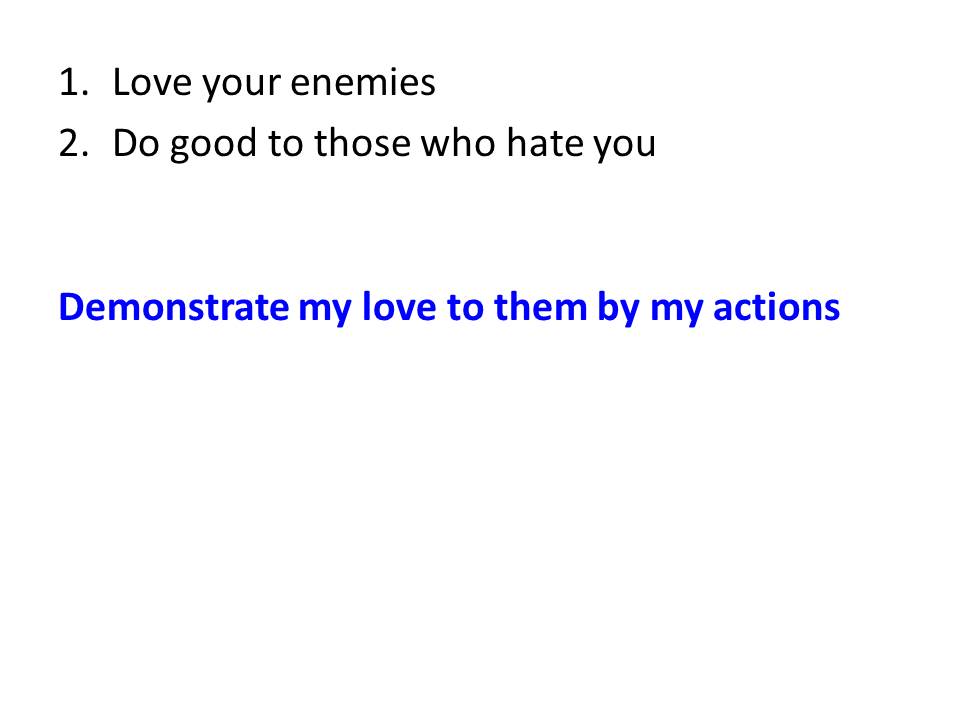
SLIDE 11
I would prefer to see them arrested and charged for their offences and receive a long spell in prison. After all, that’s what the law requires.
And we should all be good law-abiding people.
Or is this verse suggesting that maybe instead I should have a more lenient attitude
That perhaps I should argue for a light sentence for my attackers, or perhaps even try to help in their restoration to society?
No, I’m sorry, but that’s just not good enough, it’s not what Jesus has in mind. Look at Verse 35
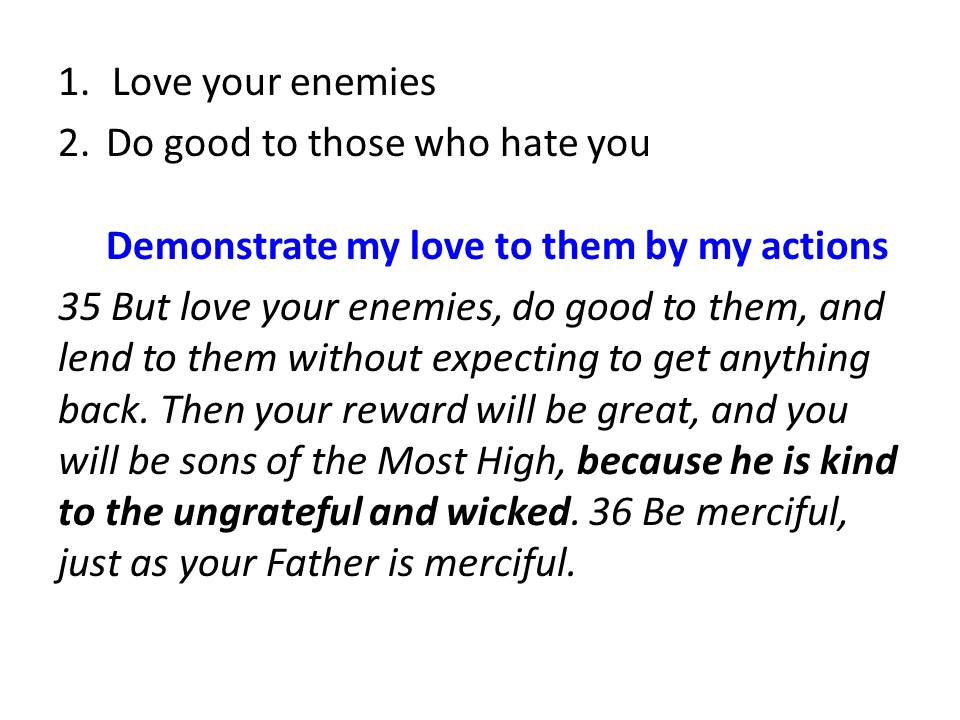
SLIDE 12
Me READ:
But love your enemies, do good to them, and lend to them without expecting to get anything back. Then your reward will be great, and you will be sons of the Most High, because he is kind to the ungrateful and wicked. 36 Be merciful, just as your Father is merciful.
This suggests that having had everything taken from me, I’ve now got to offer the robbers some more, and I mustn’t expect to get it back!
Something for us all to think about: Who exactly are the ungrateful and wicked people that Father God is kind and merciful to?
We may have struggled so far, but now Jesus continues

SLIDE 13
3) Bless those who curse you
This is linked to the previous phrase where, for whatever reason, someone now feels personal animosity against me. Jesus explains that my response of love to them has to be from the heart. It’s not good enough to say
‘Well, as a Christian I automatically love everybody – really – deep down.’
I now have to demonstrate that my love is real. I now have to consciously seek the good of those who oppose or attack me so strongly. And I have to verbalise my feelings in the form of a blessing. (Add ‘confirm my love by saying it out loud’)
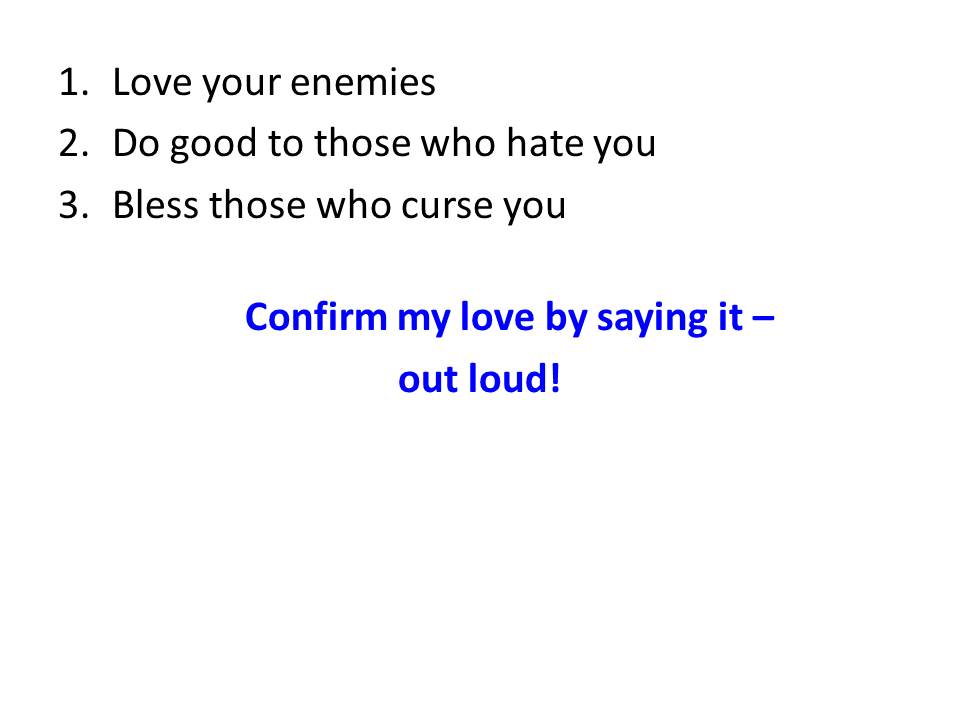
SLIDE 14
If we mentally decide to do something, it helps to say so out loud (perhaps to someone else) to actually confirm that we mean it!
It doesn’t stop there!

SLIDE 15
4) Pray for those who ill-treat you
What should we pray
Well I know what I might want to pray
- I’d like to ask God to intervene against those who ill-treat me.
- Or, ask Him to change their attitude towards me.
- I’d like to ask God to change their wicked ways.
These are all valid prayers that God might well answer for you, but that is not what Jesus meant.
Look back at No. 3 (Indicate screen) Bless those who curse you.
Now we are expected to confirm our response, which we had to say out loud.
Now we have to repeat it as a prayer to God.
Jesus expects us to ask God to bless the very ones who are my enemies.
That is so contrary to what our normal response would be. Usually we would
- look for some form of retribution
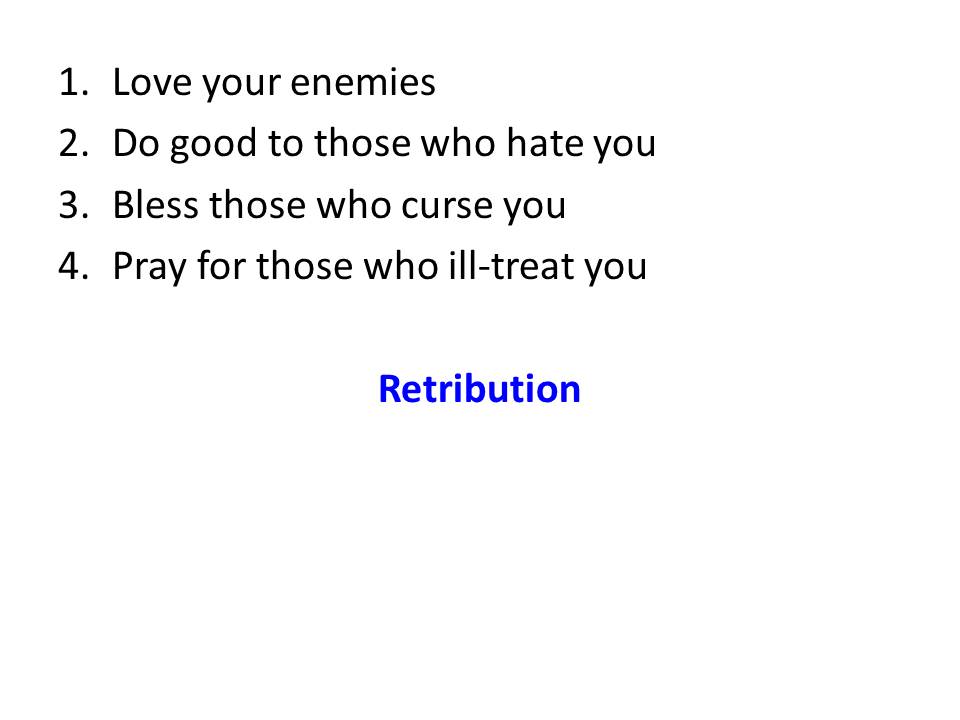
SLIDE 16
- or at least justice
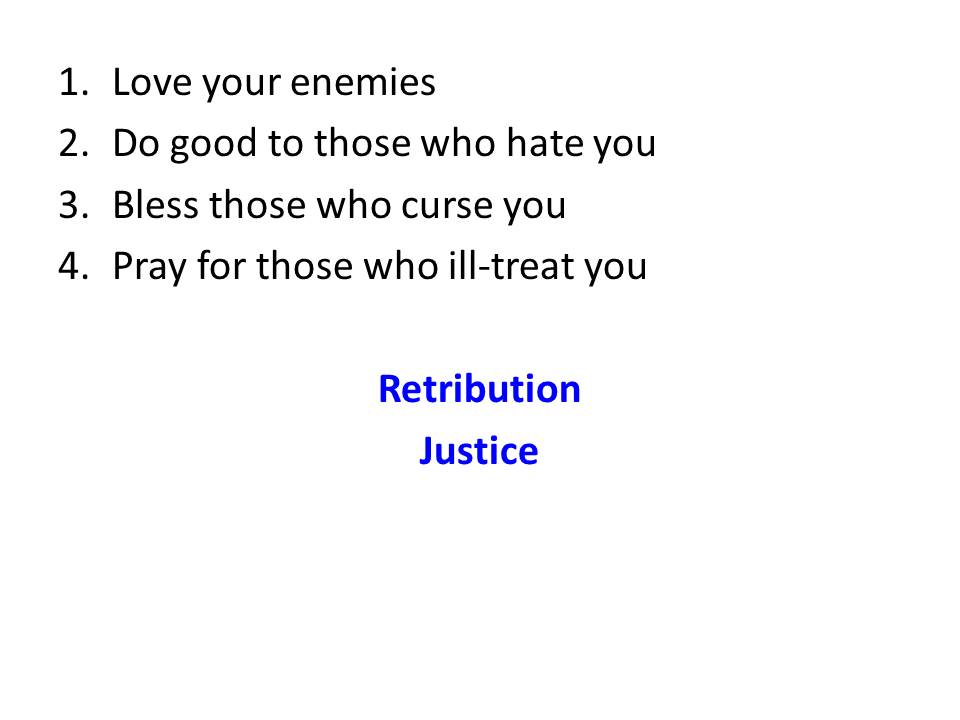
SLIDE 17
- we naturally expect suitable punishment for the wrong-doer
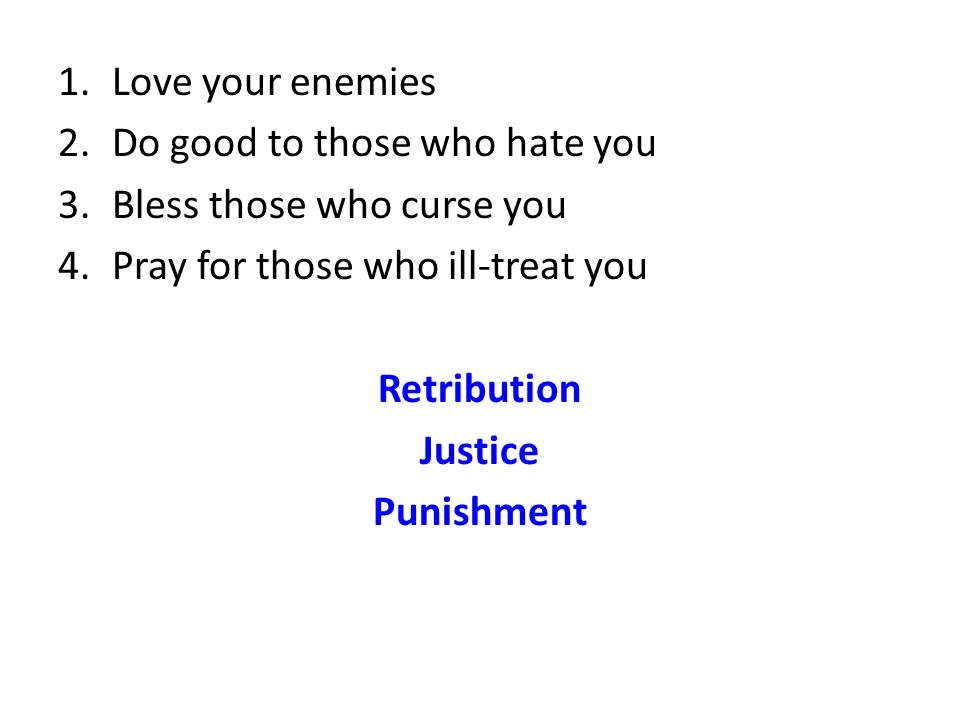
SLIDE 18
- and perhaps a payment to us by way of compensation.
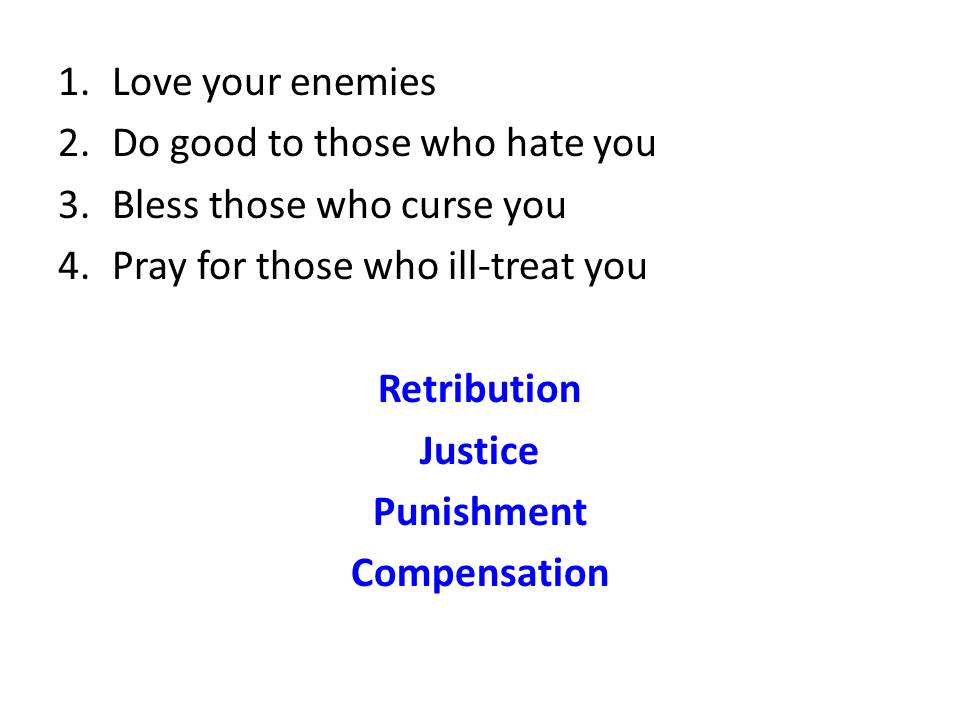
SLIDE 19
Sorry –
Retribution, justice: punishment and making amends, are not for us to demand. Not only that, but it is entirely opposite to the attitude Jesus demonstrated to us.
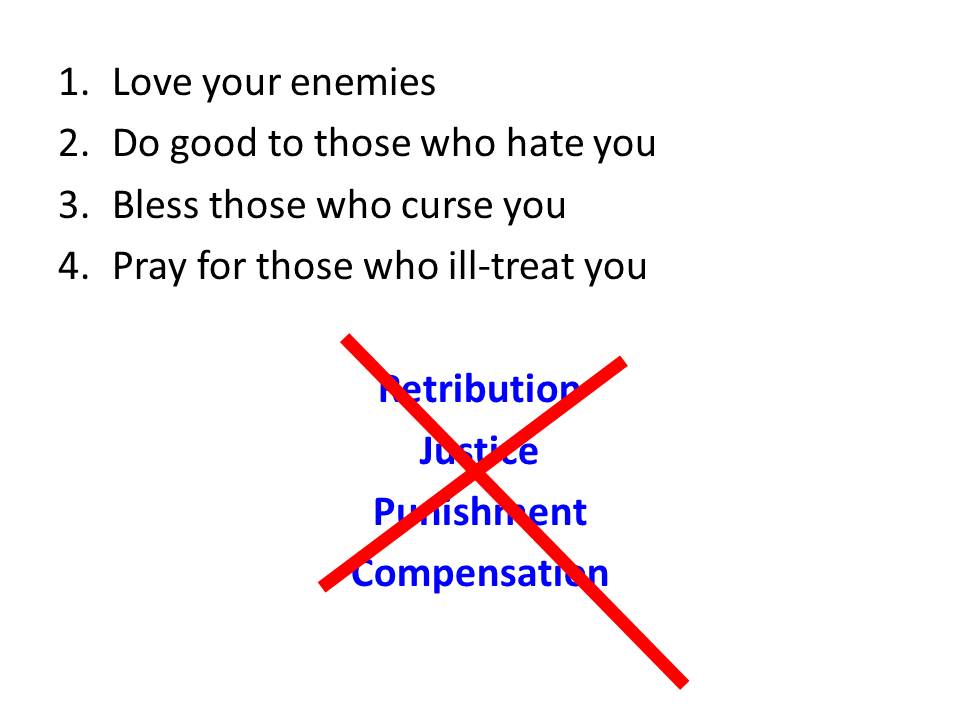
SLIDE 20
Now read: (Not on screen)
Isaiah 53:7 says
He was oppressed and afflicted, yet he did not open his mouth;
he was led like a lamb to the slaughter, and as a sheep before her shearers is silent, so he did not open his mouth
Now look at verse 37
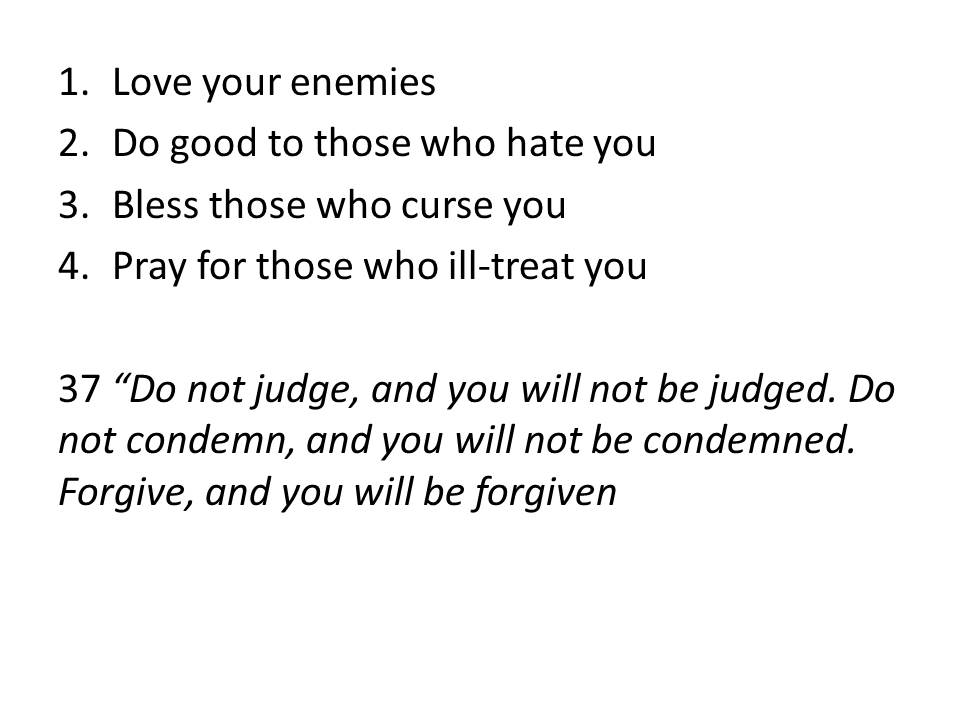
SLIDE 21
“Do not judge, and you will not be judged. Do not condemn, and you will not be condemned. Forgive, and you will be forgiven
Wait a bit before continuing
How many times have we glibly prayed:
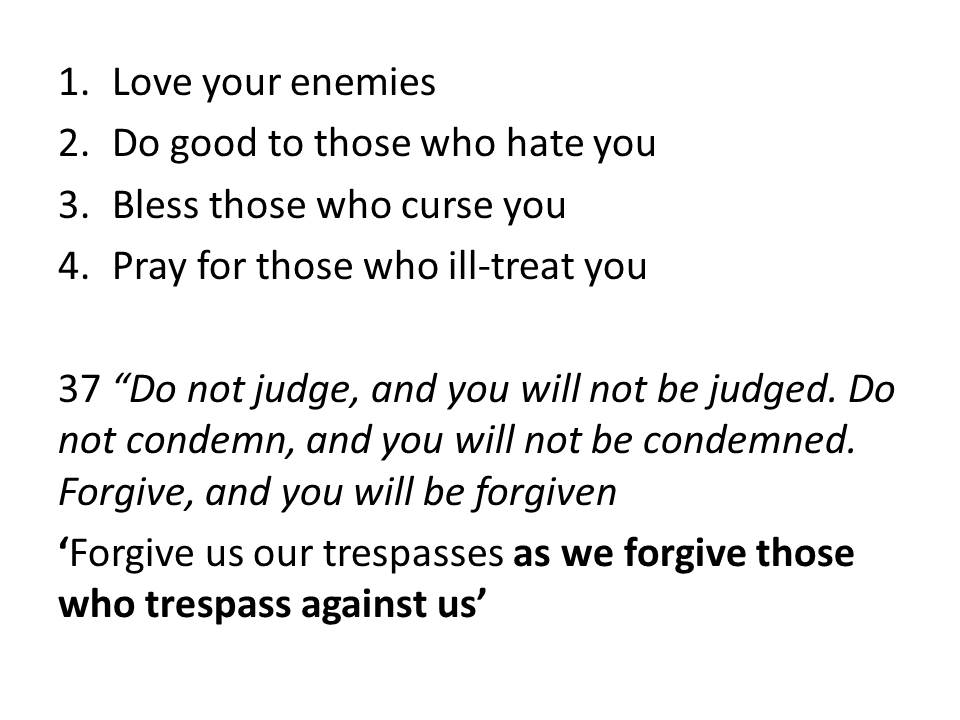
SLIDE 22
‘Forgive us our trespasses as we forgive those who trespass against us’
Let’s move on – and it doesn’t get any easier

SLIDE 23
5) If someone strikes you on one cheek, turn to him the other also
If we are to live as Jesus did, we will have to accept injustice and the suffering that accompanies it, without complaint. More than that, we must not resent it. But even more than that – whatever has been done to us, we must be happy for it to be repeated, even for it to be on-going.
Now please tell me that I have read this wrong. Surely this isn’t a command of Jesus?

SLIDE 24
Verse 32
32 “If you love those who love you, what credit is that to you? Even ‘sinners’ love those who love them.
33 And if you do good to those who are good to you, what credit is that to you? Even ‘sinners’ do that.
Let’s continue

SLIDE 25
Number 6
6) If someone takes your cloak, do not stop him from taking your tunic. Give to everyone who asks you, and if anyone takes what belongs to you, do not demand it back.
We would love to add provisos to this too. ‘Well, I might be happy if he took it because he’s cold and starving, but if he just steals to get money for drugs, then that’s different’.
Sorry again, because that’s not the way Jesus treats us. Look at the whole passage from verse 31
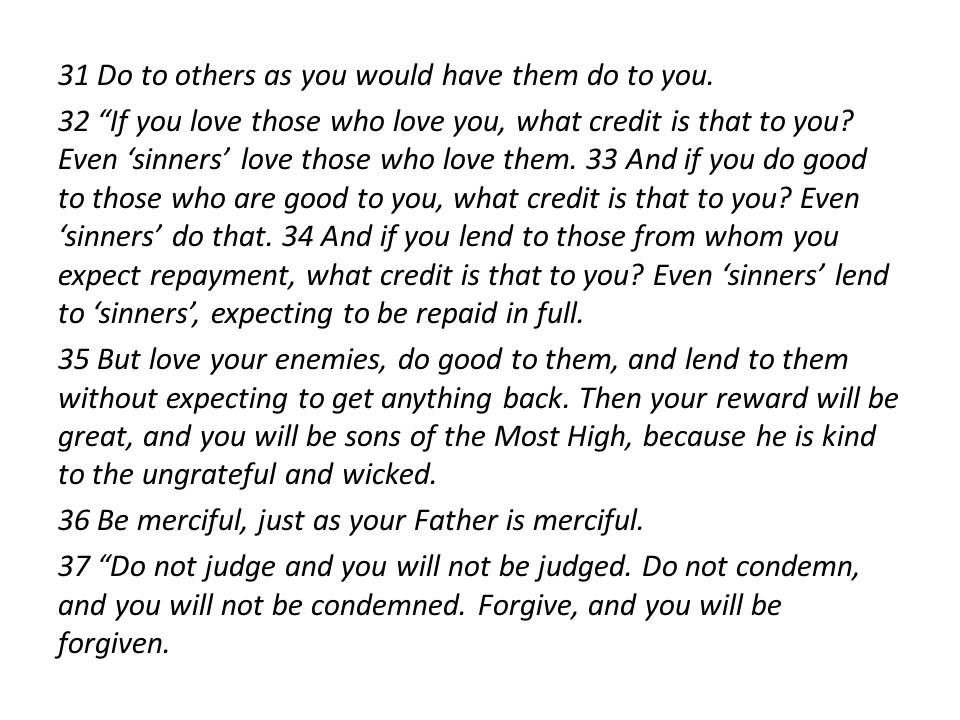
SLIDE 26
READER:
31 Do to others as you would have them do to you.
32 “If you love those who love you, what credit is that to you? Even ‘sinners’ love those who love them.
33 And if you do good to those who are good to you, what credit is that to you? Even ‘sinners’ do that.
34 And if you lend to those from whom you expect repayment, what credit is that to you? Even ‘sinners’ lend to ‘sinners’, expecting to be repaid in full.
35 But love your enemies, do good to them, and lend to them without expecting to get anything back. Then your reward will be great, and you will be sons of the Most High, because he is kind to the ungrateful and wicked.
36 Be merciful, just as your Father is merciful.
37 “Do not judge and you will not be judged. Do not condemn, and you will not be condemned. Forgive, and you will be forgiven.
Forget about ‘love the sinner but not the sin’. That’s also watering down Jesus’ commands to us. It gives us a reason for righteous indignation. As soon as we feel righteous and indignant, we have judged someone else, and Jesus tells us in v37 not to do that.
If we are going to be ambassadors for Jesus, and try to live like him;
If we are going to try to copy his example, then we will have to love unconditionally and give unconditionally, and expect nothing in return.
Instead we must expect injustice, and we must not seek retribution.
We read at the end of verse 35: because he is kind to the ungrateful and wicked. 36 Be merciful, just as your Father is merciful.
Now we can look at verse 31 again

SLIDE 27
‘Do to others as you would have them do to you.’
Or we could change the words slightly and say ‘Do to others as you would have Jesus do to you’. If we want other people to receive just punishment for their wrong-doing, how can we expect mercy for our sins? Jesus died, the just for the unjust: specifically so that we will not have to suffer the punishment for our sins.
Actually, if I was to be honest, I would really like to have other people treat me with the love and compassion of Jesus. I would actually prefer to be loved in return every time I do or say things which I regret. And if I’m being honest I would prefer not to receive any punishment for my wrong-doing.
Imagine the relief if I had been out driving, had taken a corner far too fast, was right over the white line, and I had carelessly scraped all down the side of a car coming the other way. We both stopped and got out. The other driver came running over and said
What might we expect him to say? – or do!
Imagine our amazement if instead he said: ‘don’t worry about it; think no more about it, it’s not a problem, it was an accident. Look it was probably just as much my fault – let me pay for the repairs. Is there anything else I can do to help?’ (Indicate verse on screen) That’s exactly what I ‘would have him do to me’
Back in the 1990s, young people started wearing wristbands with WWJD written on them: ‘What Would Jesus Do?’
The command to ‘love my neighbour’ and ‘do to others as you would have them do to you’ is not just a nice way for people to get on together. It is actually a very hard command to live like Jesus.
But surely the Bible shows that wrongdoing must be punished. Society needs laws, with those in authority over us to maintain law and order. The Jews already had strict Mosaic laws, and they were permitted those within the Roman legal system. Jesus was not suggesting that either of those systems should be abandoned.
The way of the world is ‘If you hit me, I’ll hit you back’ which leads directly to: ‘If you attack my country, I’ll ask America to bomb you’.
So how can we apply this teaching
It can only be applied at a personal level.
Jesus was not speaking to the Jewish religious leaders. He was not speaking to the Romans. He wasn’t speaking to those people who had no time for him.
Jesus was specifically speaking to his Disciples – those people who were already Christians and were following him.
And remember, just that very morning he had chosen Apostles to go out into the world in his name, as his ambassadors.
If they were to go in his name, if they were to truly show Jesus to others, Jesus had to explain to them how to react to those they would encounter in the world. How he would react.
Jesus never expected this to be adopted as a nice way for society to behave; rather it is a hard path for Christians to follow. For those who have committed their lives to Jesus and who want to live like him. And it is this, more than anything, which marks out Christians to those who are in the World.
So this message has to be for us as individuals.
We are expected to change our whole attitude.
Paul wrote to the Philippians (Philippians 2:5-7)
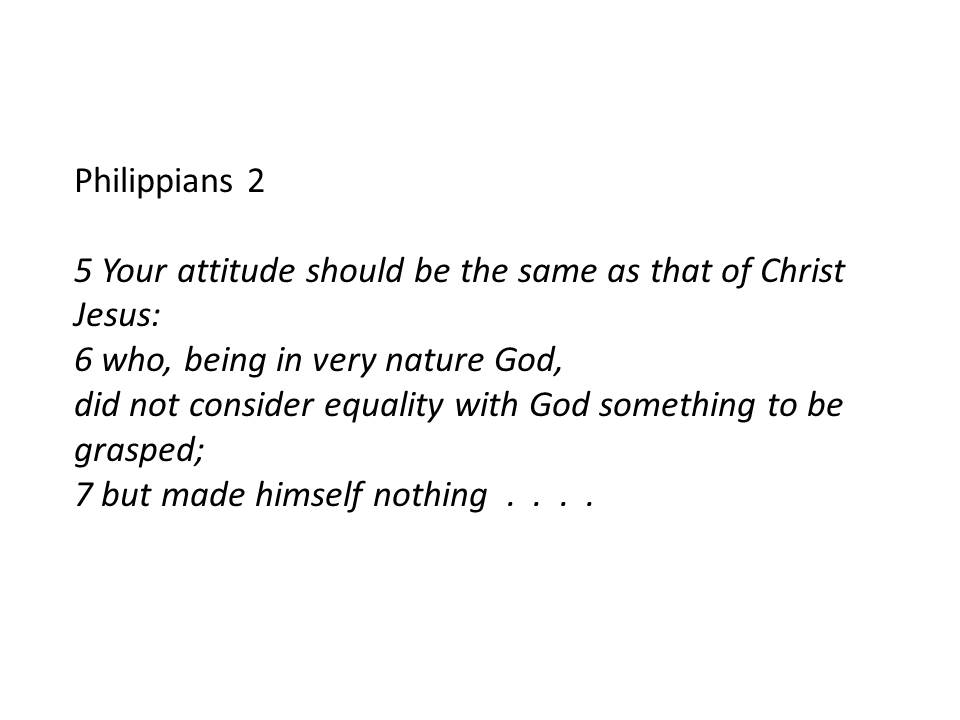
SLIDE 28 READ
5 Your attitude should be the same as that of Christ Jesus
6 who, being in very nature God,
did not consider equality with God something to be grasped;
7 but made himself nothing . . . . .
To conclude, we can now complete our reading from verse 35
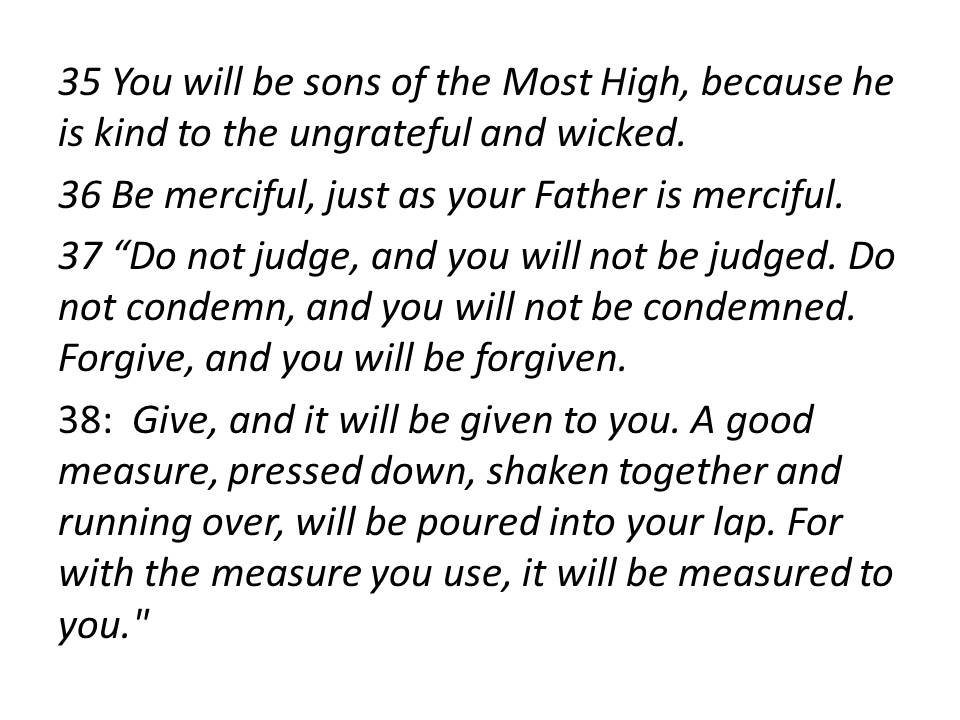
SLIDE 29
35 You will be sons of the Most High, because he is kind to the ungrateful and wicked. 36 Be merciful, just as your Father is merciful.
37 “Do not judge, and you will not be judged.
Do not condemn, and you will not be condemned.
Forgive, and you will be forgiven.
38 Give, and it will be given to you.
A good measure, pressed down, shaken together and running over, will be poured into your lap. For with the measure you use, it will be measured to you."

SLIDE 30

